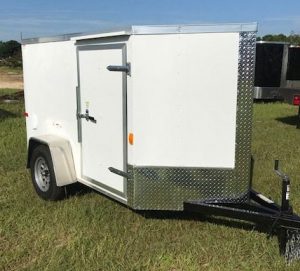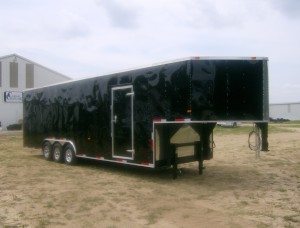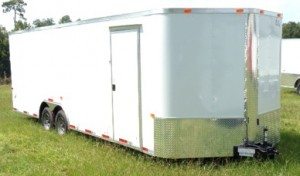How Much do Different Types of Trailers Weigh?
If you’re in the market for a trailer, there are many different trailer types to choose from. Each has a specific purpose. Trailers vary considerably in terms of capacity, construction, length, and weight, so we thought we’d lay it all out for you to make comparing the different types much more straightforward.
At the end, we’ll also share some tips to help you choose the right trailer for your needs.
The following guide provides the average weight for different types of trailers, together with the weight range, GVWR or Gross Vehicle Weight Rating, and average load capacity.
You can purchase some of the trailers in this list from us here at Trailers123. Call us today to discuss your purchase.
How Much Does a Trailer Weigh and What is its Capacity?
On average, trailers can weigh anything from a few hundred pounds to a couple of thousand. The specifics depend on the type of trailer, how it’s constructed, and what you will use the trailer for.
The following information is meant to be a general guideline. The actual rating and weight of any trailer you purchase could vary.
How Heavy are Enclosed Trailers and What Are Their Capacity?
There are two types of enclosed trailer to choose from. The first is a single axle trailer that you can use to transport a variety of things. The empty weight ranges from 700 pounds for the smallest size (5x8) up to a maximum of 1,725 pounds for a 7x16 trailer. The actual weight is determined by the materials the manufacturer has used in the trailer’s construction.
When a single axle trailer is fully loaded, it can be rated for a maximum of 3,500 GVWR. However, for trailers that are 10 feet long or less, the average payload capacity is 2,250 pounds.
The second type of enclosed trailer has tandem axles. These trailers are typically used to transport larger and heavier items, in many cases, as much as three times more than a single axle trailer. They are also more stable and better suited for towing over long distances. The average empty weight of a tandem axle trailer is 1,775 pounds for the smallest size (6x12).
A much larger trailer, for example, 7x24, has an empty weight of 2,825 pounds. Tandem axle trailers have an average payload capacity that ranges from 5,225 pounds to 4,175 pounds. They are rated up to 7,000 GVWR.
Here are the enclosed single and tandem axle trailers weights and payload capacity for Cargo Craft trailers.*
| Size | Empty Weight | Payload Capacity |
| 3500 GVWR | 3500 GVWR | |
| 5x8 | 890 | 2610 |
| 5x10 | 990 | 2510 |
| 5x12 | 1090 | 2410 |
| 3500 GVWR | 3500 GVWR | |
| 6x10 | 1250 | 2250 |
| 6x12 | 1340 | 2160 |
| 6x14 | 1560 | 1940 |
| 6x16 | 1780 | 1720 |
| 3500 GVWR | 3500 GVWR | |
| 7x10 | 1275 | 2225 |
| 7x12 | 1385 | 2115 |
| 7x14 | 1650 | 1850 |
| 7x16 | 1725 | 1775 |
View our Single Axle trailers.
| Tandem Axle Trailers | ||
| Size | Empty Weight | Payload Capacity |
| 7000 GVWR | 7000 GVWR | |
| 6x12 | 1775 | 5225 |
| 6x14 | 1925 | 5075 |
| 6x16 | 2075 | 4925 |
| 7x12 | 1925 | 5075 |
| 7x14 | 2200 | 4800 |
| 7x16 | 2225 | 4775 |
| 7x18 | 2375 | 4625 |
| 7x20 | 2525 | 4475 |
| 7x22 | 2675 | 4325 |
| 7x24 | 2825 | 4175 |
How Much Does a Gooseneck Trailer Weigh?
The smallest size of gooseneck trailer, for example, 7x18, weighs 3,000 pounds when it’s empty and has a payload capacity of 7,000 pounds. A much larger gooseneck trailer, for example, 8.5x40, weighs 5,000 pounds empty and has a payload capacity of 16,000 pounds.
How Much Does an Enclosed Gooseneck Trailer Weigh and What is its Capacity?
An enclosed gooseneck trailer usually has a higher weight rating than a trailer you would attach to your vehicle’s towbar. Typically, it will weigh between 3,000 and 5,000, depending on the size.
Here are the enclosed gooseneck trailers weights and payload capacity for Cargo Craft trailers.*
| Size | Empty Weight | Payload Capacity |
| 10000 GVWR | 10000 GVWR | |
| 7 X 18 | 2840 | 7160 |
| 7 X 20 | 3140 | 6860 |
| 7 X 22 | 3300 | 6700 |
| 7 X 24 | 3450 | 6550 |
| 7 X 26 | 3600 | 6400 |
| 8.5x26 | 3750 | 6250 |
| 8.5x28 | 4380 | 5620 |
| 8.5x30 | 4560 | 5440 |
| 8.5x32 | 5040 | 4960 |
View our View our Gooseneck trailers.
| Size | Empty Weight | Payload Capacity |
| 12000 GVWR | 10000 GVWR | |
| 8.5 X 24 | 3800 | 8200 |
| 8.5 X 26 | 3950 | 8050 |
| 8.5 X 28 | 4100 | 7900 |
| 8.5 X 30 | 4250 | 7750 |
| 8.5 X 32 | 4400 | 7600 |
| 8.5 X 34 | 4550 | 7450 |
| 8.5 X 36 | 4700 | 7300 |
| 8.5 X 38 | 4850 | 7150 |
| 8.5 X 40 | 5000 | 7000 |
How Much Does a Car Trailer Weigh and What is its Capacity?
An unloaded car trailer usually weighs between 1,000 and 3,000 pounds. The average is around 1,900 pounds. If this type of trailer is loaded with one or more cars, the average weight can increase by as much as 36,000 pounds. However, this depends on the type of cars being transported.
The maximum capacity of this type of trailer depends on its construction and additional features. Typically, it will range from 1,500 pounds up to 6,000 pounds or more.
How Much Does an Enclosed Car Trailer Weigh and What is its Capacity?
An enclosed car trailer weighs much more than an open car trailer. For an auto carrier that is 8.5x16, the empty weight is 2,500-2,800 depending on the GVWR. The payload capacity for this type of trailer is 4,500 to 7,200 pounds.
Here are the enclosed car trailers weights and payload capacity for Cargo Craft trailers.*
| Size | Empty Weight | Payload Capacity |
| 7000/10000 GVWR | 7000/10000 GVWR | |
| 8.5x16 | 2500/2800 | 4500/7200 |
| 8.5x18 | 2650/2950 | 4350/7050 |
| 8.5x20 | 2800/3100 | 4200/6900 |
| 8.5x22 | 2800/3250 | 4050/6750 |
| 8.5x24 | 3100/3400 | 3900/6600 |
| 8.5x26 | 3250/3550 | 3750/6450 |
| 8.5x28 | N/A / 3700 | N/A / 6300 |
| 8.5x30 | N/A / 3850 | N/A / 6150 |
| 8.5x32 | N/A / 4000 | N/A / 6000 |
View our Auto Carrier/Car Hauler trailers.
How Much Does a Concession Trailer Weigh and What is its Capacity?
You’ll often see examples of concession trailers at festivals, carnivals, and other fun events. They can be used to display various things, games, or to serve food. Concession trailers generally weigh between 1,500 and 2,000+ pounds, depending on the size and the features of the trailer.
How Much Does a Motorcycle Trailer Weigh and What is its Capacity?
A motorcycle trailer is designed for the transportation of motorcycles, one or more, and is usually towed by another vehicle. Unloaded, a motorcycle trailer can weigh between 300 and 800 pounds. The average weight is around 500 pounds.
Motorcycle trailers are usually rated for a maximum trailer weight of 1,300 to 3,500 pounds. This makes its average load capacity slightly less than 2,000 pounds.
How Much Does an Enclosed Motorcycle Trailer Weigh and What is its Capacity?
If you require a little more protection for your motorcycle, an enclosed motorcycle trailer is the best option. Your motorcycle is completely protected from the elements and prying eyes. Another benefit of an enclosed motorcycle trailer is that you can put several items in the trailer with your motorcycle.
Unloaded, an enclosed motorcycle trailer can weigh between 1,775 and 2,825 pounds. The payload capacity ranges from 4,175 to 5,225 pounds.
How to Choose the Right Trailer Capacity According to Your Needs
If you’ve never purchased a trailer before, understanding the different trailer sizes can be confusing. Whether you need to haul a motorcycle, building materials, or your food service business, there’s a trailer size to suit your specific needs.
To determine what size of trailer you can tow, you need to gather some key information. First of all, find the gross vehicle weight rating of the vehicle you plan to use to tow the trailer. Next, decide what you’re going to be towing, how far you plan to travel, and whether your load can be exposed to the elements. This information will help you determine which type of trailer is best for your needs.
Towing Vehicle
The GVWR (Gross Vehicle Weight Rating) is something you should know and understand. This rating tells you exactly the maximum weight of cargo and passengers you can safely carry in your car, pickup truck, or SUV. GVWR is the total combined weight of the vehicle, together with the passengers, fuel, cargo, and fluids. The weight of the trailer tongue also has to be included in the GVWR. All these figures are important because you must know the actual weight capacity you have left for when you hook up your trailer.
Let’s give you an example to demonstrate:
You own a 5,000 pound truck with a 6,300 pound GVWR. This means you can safely carry 1,300 pounds in your vehicle. If you want to tow a trailer with a 400-pound tongue weight, the weight of the passengers and any gear you can carry is reduced to 900 pounds. Because you probably already own your towing vehicle, its GVWR is a major factor in deciding what size trailer to get.
In addition to the towing capacity of your vehicle, you should know and understand how much your trailer weighs, along with its payload capacity, tongue weight, GVWR, and Gross Axle Weight Rating. Let’s explain what these terms mean.
Gross Axle Weight Rating
This figure relates to the highest distributed weight vehicle’s axle can support. When given in vehicle specifications there are usually two figures: FR which indicates the front axles and RR that relates to the rear.
Gross Vehicle Weight Rating (GVWR)
The GVWR is the maximum weight for your trailer and cargo combined. You’ll find this information on the trailer’s VIN label and also in the manufacturer’s specification sheet. The trailer will have a VIN label on the driver’s side if it’s new or on the tongue of the trailer if it’s an older model.
Trailer Weight
This is the weight of a trailer that’s fully assembled but has no cargo. If you want to check the weight of your trailer, you can do this at many truck stops or locations where there is a scale that has been certified.
Capacity of the Payload
This figure relates to the trailer’s total weight capacity. You can calculate the highest payload capacity by subtracting the trailer weight from whatever the GVWR is.
Tongue Weight
This is a figure for your trailer’s weight which is transferred to your tow vehicle via the trailer’s gooseneck or tongue. The tongue weight can be checked on a certified scale. A general rule to follow is that 20 to 25% of the trailer’s total weight plus that of its cargo must be on the trailer’s tongue.
Trailer Load Limit
When you’re certain of all the above factors you can start to determine the safest load limit for your trailer. An important thing to remember is that the total weight of your fully-loaded trailer cannot exceed the listed GVWR. always load your trailer properly and follow the proper air pressure recommendations listed on your trailer’s VIN label or Tire Placard.
How to Determine Your Trailer’s Load Limit
To determine the load limit of a trailer, you first have to locate the VIN or Federal Certification label on your trailer. It should be on the left side. This label has some important information including your trailer’s GVWR and GAWR.
Trailers with a GVWR of 10,000 pounds or less will also have a placard in the same spot that includes tire, loading information, and maximum cargo capacity. You can add cargo up to the maximum weight specified on this placard. The dealer where you purchased your trailer should be able to provide all this information. Here at Trailers123, we make sure all our customers have this information when they make their purchase.
How to Determine Your Tow Vehicle’s Load Limit
As well as determining your trailer’s load limit, it’s also critical that you determine the correct load limit for the vehicle that is going to be doing the towing. This is especially important if you plan to use different vehicles to tow your trailer.
The vehicle’s placard should be the first place to look. It will give you a figure for the maximum combined weight of occupants and cargo. Calculate the combined weight of the driver and any passengers that will be in the vehicle when you tow. Subtract this combined weight from the number listed on your vehicle’s placard. The remaining number is the available amount of luggage and cargo capacity.
Let’s give you an example to demonstrate what we mean.
Imagine the total weight of your passengers is 800 pounds. The number listed on your trailer’s placard is 1450 pounds. This means your available luggage and cargo capacity is 650 pounds.
The next step is to calculate the combined weight of the cargo and luggage you’re loading on the vehicle. It shouldn’t be greater than the available luggage and cargo capacity calculated.
Not exceeding the maximum weight capacity for the trailer is important for towing stability. A properly loaded trailer will perform better and handle more safely. Likewise, a towing vehicle that is too light for the trailer may result in damage, poor performance, hazardous handling, and possible injury.
Now you know all there is to know about the weight and capacity of different trailers and the importance of calculating loads correctly. Armed with all this information, you will make a more informed decision when choosing the type of trailer to buy.



